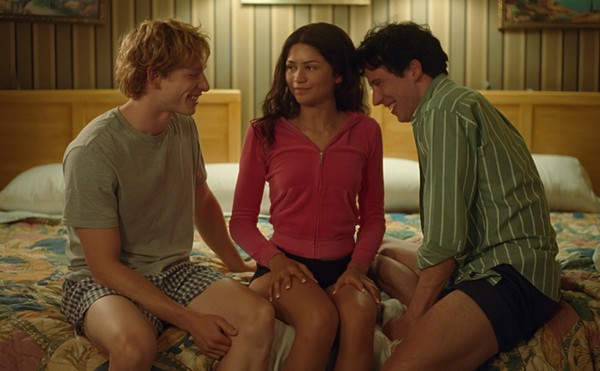Co-producer Chris Columbus, who directed the first two Potter films, seems to have taken it as his mandate to find a director as different from himself as possible who's still capable of working within the designated framework -- Cuarón inherits most of the actors and sets originally selected by Columbus and his crew, though the new director has changed the geography of things a bit. Both the Whomping Willow and Hagrid's hut have relocated to a mountainside, and with the unfortunate passing of Richard Harris, original Singing Detective Michael Gambon gets to be the new Albus Dumbledore. (Gambon's actually an improvement, playing the wizard headmaster as a more deliberately cryptic character rather than an aging scatterbrain.)
As the J.K. Rowling books get progressively darker, it's wise to jettison Columbus from the helm at this stage. Though he did perhaps his finest directorial work ever on The Sorcerer's Stone, Chamber of Secrets saw an increasing amount of the director's trademark sentimentality start to creep in. Cuarón's mandate appears to have been "Make it darker!" So tonally and visually, more darkness is what we get -- some scenes look almost like frames from a silent film. In conjunction with regular big-screen Potter adapter Steve Kloves, Cuarón has also taken more narrative liberties than Columbus did, and all of them are good, restructuring the film's chronology for increased dramatic impact. There are still a few loose ends that are better explained in the book (most notably the backstory of the magical map used by Harry), but there's only so much one can cram into two and a half hours without younger viewers walking out in impatience.
That is, unless they've already run screaming; this is by far the scariest of the Harry Potter films and should not be viewed by little ones prone to nightmares. Harry runs away from home early on, is chased by an apparent werewolf, encounters talking shrunken heads (a particularly gruesome Cuarón addition), then finally makes it safely to Hogwarts only to discover that a bunch of soul-sucking zombies called "dementors" have been invited to take up residence around the school, and they might just kill any student who comes near them. They've been sent from the Azkaban Prison for magical criminals in search of a recent escapee, the titular prisoner Sirius Black (Gary Oldman, shamelessly and hilariously mugging), who's expected to wreak havoc upon Harry if he ever catches up to the lad.
Every English actor working today is required to do one of these films at some point, so Prisoner of Azkaban introduces numerous new Brits -- though there's still plenty of time for the old favorites. Robbie Coltrane is always dependable as the half-giant Hagrid, and Alan Rickman's brooding Snape is a joy once more. As Harry's best friend Ron, Rupert Grint has finally had his voice break, but he's not a lot of use, unless you consider infinite utterances of the word "brilliant" to be useful. There are hints dropped to a future potential romance with Hermione (Emma Watson), which can only be because she needs someone helpless to take care of.
As for Harry himself (Daniel Radcliffe), let's just say it's a shame that Star Wars Episode III has wrapped principal photography, because Hayden Christensen could learn a lot from young Radcliffe's portrayal of adolescent angst meeting magical fury. Unfortunately, perennial rival Draco Malfoy (Tom Felton) gets short shrift this time, losing all his menace and becoming, to put it bluntly, a whiny little bitch.
In the Harry Potter film series thus far, The Sorcerer's Stone remains the strongest, perhaps because the first look at any rich new world is almost always going to be more groundbreaking than its sequels. But Prisoner of Azkaban is a worthy and stylistically different follow-up, where Chamber of Secrets often felt like an unimaginative retread. Haven't read the next two books in the series yet, but here's hoping that they avoid the running cliché of the Scooby-Doo scene that all three films rely on, in which the one character who isn't who you think he is gets found in some heretofore undiscovered room, where he proceeds to explain the entire plot so far to Harry and us. It was cool the first time because the character in question had a monster face growing out of the back of his head, but it's getting old as a narrative device. Blame Rowling, but Kloves and Cuarón so deftly rearrange other parts of the story that it really stands out when they fall ever-so-slightly short.





